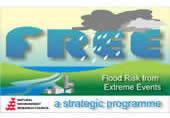Project

FREE - Land Use Management Effects in Extreme Floods
Abstract
The Land Use Management Effects in Extreme Floods project is a NERC Flood Risk for Extreme Events (FREE) Research Programme project (Round 2 - NE/F001134/1 - Duration December 2007 - March 2011) led by Prof PE O'Connell, Newcastle University. The data and metadata from this project will be stored at the BADC.
Details
| Keywords: | Not defined |
|---|---|
| Previously used record identifiers: |
http://badc.nerc.ac.uk/view/badc.nerc.ac.uk__ATOM__ACTIVITY_c430f130-43e0-11e1-85c9-00163e251233
http://badc.nerc.ac.uk/view/badc.nerc.ac.uk__ATOM__dataent_12275567859526942
|
More Information (under review)
It is increasingly recognised in the UK (eg Making Space for Water, Defra, 2005), and internationally, that the management of land and water is strongly interdependent, and that integrated management approaches are needed. There are particular issues for floods, where there is evidence that agricultural land management can increase local flood risk, but no evidence-based quantification of downstream impacts at larger scales. If such effects exist, as the local evidence suggests, clearly there is potential for use of land management to mitigate flood risk.
The basic scientific question to be addressed in this research is therefore: how do the effects of land use management propagate from the local scale (~ 1 ha, and below) to that of mesoscale catchments (~ 100 km2) and affect extreme floods? If an answer can be found, it will be possible to make useful predictions for the effects of future land use management changes on extreme floods. Such predictions would have wide use, including in preparing catchment flood management plans.
Research like this demands high-quality long-term data sets, but there are relatively few data sets available. Modelling is essential to make the best use of the available data and to encapsulate and explore the understanding of the processes involved in the link between changes in land use management and flooding. Unfortunately, our current rainfall/runoff models are simply inadequate for this task, because they cannot adequately represent the underlying complexity associated with the effects of land use management on runoff generation, or the propagation of these effects downstream.
The level of activity and interest in understanding and manipulating the link between land use management and flooding is very high, and recent mitigation works and investments in field research have resulted in new unique and important data sets being available to the Investigators: the FRMRC field sites at Pontbren in the upper Severn catchment; the CHASM multi-scale monitoring for the Eden catchment; and the Sustainable Catchment Management Programme (SCaMP) large-scale land use management changes currently underway in the Ribble catchment. There are also new relevant developments in modelling, including local-scale runoff generation modelling developed at Imperial College and network routing modelling and information tracking methods developed at Newcastle University.
This data and modelling will be brought together to tackle the basic scientific question above, within the practical context of predicting the likely effects that given land use management mitigation and adaptation strategies would have in reducing flood risk in the Severn, Eden, and Ribble catchments, for a range of specified extreme flood return periods. This project will provide improved scientific understanding of the effects of land use management in extreme floods, and also provide results of the type required by those involved in decision-making, such as consultants and policy makers looking for answers to some of the general questions raised in Defra's Making Space for Water consultation. The results will include maps showing the application areas for any management interventions achieving effective downstream hydrograph attenuation, for the present and possible future climates.
The project also represents a major contribution to the next generation of whole-catchment continuous simulation modelling, which will help improve its capability and reliability for predicting the effect of land use management change on extreme flooding. The EA/Defra have agreed to fund a parallel programme of experimental research in the upper Ribble (funding £200K), to provide the necessary data for the effects of afforestation and blocking of moorland grips.
Project Duration: December 2007 - March 2011.
This project is funded by NERC - Grant Ref. NE/F001134/1 - through the Flood Risk for Extreme Events (FREE) NERC directed mode programme.
This project will develop a library of local scale metamodels of mesoscale sub-catchments of three rivers and develop a regionalisation procedure. Runoff generations modelling will be integrated into network flow models which will propagate land use management signals and uncertainty measure from local to meso-scale. A method will be developed to use network modelling to test the parameterisation of the meta-models.
The nature of propagation of land use signals will then be investigated with a view to designing a simple efficient method for routine use in flood risk assessment. This will be used to assess the effectiveness of adaption and mitigation strategies for the three river sub-catchments studied for a range of extreme flood return periods.
During this project space time rainfall fields for extreme storms will be generated under present and future climates. This is the most likely source of data suitable to be archived within this project.
The data from this project will be stored at the BADC.
Links:
- Newcastle University Civil engineering and Geosciences research - http://www.ceg.ncl.ac.uk/research/
FREE Programme documentation:
- List of projects funded under the FREE programme.
- FREE Science Plan
- FREE Implementation Plan (January 2008)
- FREE Progress Report (May 2008)
- FREE Progress Report (Oct 2008)
- Data Inputs to FREE projects
This FREE project is headed by Prof PE O'Connell of Newcastle University, with co-investigators at Newcastle University and Imperial College London.
General queries about these pages or browsing the data should be directed to the BADC support line.
FREE participants wishing to submit data should read the submission instructions. If you have publications arising from FREE research please send details [title, author(s), reference] to the BADC help desk for inclusion in the archive.
